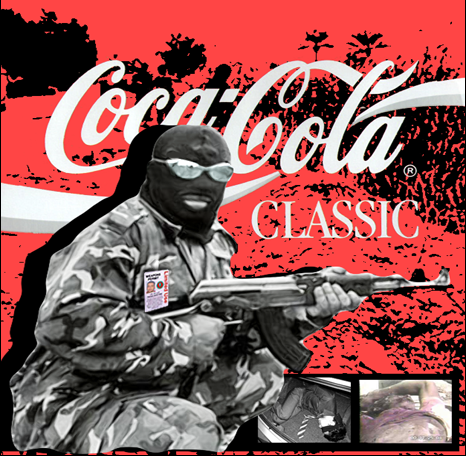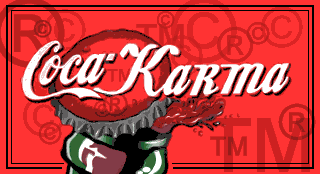Even more interesting is that at the same time that Kolody was pitching Simon, Coke failed to renew their copyright on a very famous image that appeared on their first soda can in 1961: the 'contour bottle on the Coca-Cola can' image. When Coke failed to renew the 1961 copyright (as they must do after 28 years) Kolody, the suit claims, became the de facto rights holder because he had created a derivaive work of the image for his pitch with Simon.
This was all unbeknownst to Kolody, who was still trying to fight Simon on his infringement suit.
Then, in 1993, Coke resurrected the 'contour bottle' image for their Classic Coke cans and, the suit documents, filed a fraudulent copyright application in order to protect it. This is the legal crux of the case and demands elaboration. A fundamental precept of intellectual property law stipulates that an entity is not allowed to file for a copyright on an image that has already been published and then released into the public domain or adopted by someone else. In the case of the 'contour bottle', Coke either forgot to renew their copyright or did not understand the law. When they re-filed in 1993, the copyright office warned them that to file for a copyright which has already been published is fraud. Coke went ahead and did it regardless.
In 1994 Kolody saw the 'contour bottle' on a Coke Classic Can in a Chicago airport and realized that Coke had now adopted another of his original concepts. For three years he could not get a lawyer to file his case against Coca-Cola and Simon Marketing.
Finally, in 1997, he got John De Camp - a one-time Nebraska state senator and friend of former CIA-head Bill Colby - to file. But De Camp could not afford to continue on contingency so Kolody was forced to forge on pro se (without legal representation). Kolody learned the law from every conceivable source and fought his case in court against one of the country's top intellectual property lawyers (Jerold Jacover). Using every imaginable legal dirty trick, Coca-Cola's legal team hampered Kolody's case and successfully avoided publicity on what has evolved into a $4 billion lawsuit. Furthermore, Judge Blanche Manning (the judge in this case) refused to compel Coca-Cola to demonstrate that they held the legal registrations of copyright on the contour bottle. When Kolody attained the application independently from the U.S, copyright office, Manning would not allow him to introduce the document as new evidence. This was a crushing blow to Kolody who had finally discovered proof that Coke failed to renew its copyright and then filed a fraudulent copyright application to protect themselves.
In 1999, Kolody successfully retained renowned Arkansas federal attorney Dan Ivy to fight his case. As soon as he came onto the scene, Ivy discovered a series of judicial improprieties emanating from the bench. In response, he filed several motions of 'judicial perjury' - a motion that accuses the judge of committing fraud upon the court in her blatantly favorable rulings for Coca-Cola. This is the first time in Chicago judicial history that a lawyer has leveled such a serious charge against a federal judge. But Judge Manning, instead of stepping aside to have her improprieties assessed by an independent Judge, ruled on these charges herself - a practice that defies the principles of Anglo-Saxon law. |
|
What happened next is like a plot from a John Grisham novel. After Judge Manning dismissed Kolody's lawsuit with a summary judgment, Ivy moved the case to the Appellate Court. But, in an apparent effort to censure the crusading attorney for his conduct, the 7th Circuit Court of Appeals denied his entrance to the bar, leaving Kolody without an attorney. What makes this even more intriguing is that all eleven Judges of the Appellate met in a rare, closed-door 'en banc' hearing to deny his request and offered no elaboration for their decision. After filing a motion for clarification of their ruling (under the 14th Amendment), Ivy, was denied 'en banc' a second time and no reason given for the refusal.
There have also been a number of suspicious coincidences surrounding Kolody's case. Most shocking was that Kolody's own local counsel, Daniel Hanley, admitted under questioning to have a sister who was a major media buyer for Coca-Cola in the United States and that he had been feeding her information of Kolody's legal strategy. What's more, an affidavit was filed by famed court reformer Sherman Skolnick (who has had more judges imprisoned and disbarred for judicial misconduct than any other person in U.S. history) that ties Judge Manning to major Chicago underworld figure William F. Cellini and asserts that her Judgeship was bought through a corrupt system of dealings. Both of these charges were made in a heated court hearing that saw a group of six armed police officers enter the courtroom. To date, Hanley has not been sanctioned for his admission and neither Judge Manning nor Bill Cellini have refuted the claims made in Skolnick's affidavit.
Interesting, too, is that Coke has disregarded the case in their SEC filings. Initially this may sound innocuous, but not when you remember that Coke's entire business is the sale of their syrup formula and licensing of their logo to bottlers. This means that the bottlers have been paying license fees to a fraudulent copyright owner for seven years. Combine this with the fact that tensions between bottlers and Coke reached an all-time high last year when Coke was accused, in a major lawsuit, of dumping syrup on their bottlers in order to bolster a sagging fourth quarter earnings report.
The case is currently being appealed to Supreme Court Justice John Paul Stevens (supervisor of the 7th Circuit) under a special application for 'chamber business'. This is especially dramatic considering the fact that it was Justice Stevens who, when he was a young lawyer on the 7th Circuit, headed up a special committee that presided over what became known as the 'biggest judicial bribery scandal in United States history'. The allegations surfaced publicly when, in 1969, a maverick public crusader by the name of Sherman Skolnick brought charges against a group of Judges for bribery.
Due to the complexity of this case and the verifiable evidence of judicial misconduct on the part of Coca-Cola's lawyers and Judge Manning, we recommend that you take the time to read the entire story. We are confident that you will be neither bored nor disappointed with the dramatic recounting of this tale. |

